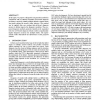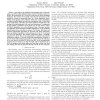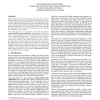ICCD
2005
IEEE
15 years 9 months ago
2005
IEEE
ICCD
2005
IEEE
15 years 9 months ago
2005
IEEE
Energy dissipation from the issue queue and register file constitutes a large portion of the overall energy budget of an aggressive dynamically scheduled microprocessor. We propo...
90
Voted
ICCD
2005
IEEE
15 years 9 months ago
2005
IEEE
In this paper, we propose a diagnostic test generation method in conjunction with an efficient sequential SAT-based diagnosis procedure to precisely identify multiple defective si...
87
Voted
ICCD
2005
IEEE
15 years 9 months ago
2005
IEEE
As CMOS technology scales deeper into the nanometer regime, factors such as leakage power and chip temperature emerge as critically important concerns for VLSI design. This paper,...
80
Voted
ICCD
2005
IEEE
15 years 9 months ago
2005
IEEE
Thermal management in microprocessors has become a major design challenge in recent years. Thermal monitoring through hardware sensors is important, and these sensors must be care...
114
Voted
ICCD
2005
IEEE
15 years 9 months ago
2005
IEEE
Performance of modern computers is tied closely to the effective use of cache because of the continually increasing speed discrepancy between processors and main memory. We demons...
88
Voted
ICCD
2005
IEEE
15 years 9 months ago
2005
IEEE
Abstract— Noise induced by impedance discontinuities from VLSI packaging is one of the leading challenges facing system level designers in the next decade. The performance of IC ...
78
Voted
ICCD
2005
IEEE
15 years 9 months ago
2005
IEEE
Traditional approaches for sequential logic optimization include (1) explicit state-based techniques such as state minimization, (2) structural techniques such as retiming, and (3...
ICCD
2005
IEEE
15 years 9 months ago
2005
IEEE
Recent studies have shown that in highly associative caches, the performance gap between the Least Recently Used (LRU) and the theoretical optimal replacement algorithms is large,...
67
Voted
ICCD
2005
IEEE
15 years 9 months ago
2005
IEEE
Increasingly significant power/ground supply voltage degradation in nanometer VLSI designs leads to system performance degradation and even malfunction. Existing techniques focus...




